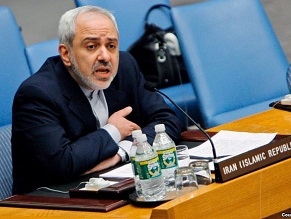|
World Jewish News

Mohammad Javad Zarif
|
Ashton : Six Foreign Ministers to meet Iranian counterpart in New York
24.09.2013, International Organizations Iranian Foreign Minister Javad Zarif will join the Foreign Ministers of six nations on Thursday in New York to discuss reviving negotiations on Iran's nuclear program, EU foreign policy chief Catherine Ashton announced after a meeting with the minister at the UN.
The six nations are the US, Russia, China, Britain, France and Germany.
‘’We had a good and constructive discussion. Foreign Minister Zarif will join the E3+3 meeting later this week, which I will be chairing, in order to have a short discussion, and we have agreed that we, he and I, will meet with our teams in Geneva in October,’ she told reporters.
‘’What I saw today was energy and determination to try and move forward in our talks. Many things flow from that, but this was the first meeting in order to establish how we will work together. We didn't talk about the details of what we will do. The purpose of this meeting was to establish how we would go forward,’’ Ashton added.
US officials said Secretary of State John Kerry will attend Thursday’s meeting. It would mark the first meeting between the top US and Iranian diplomats since US Secretary of State Condoleezza Rice met with Iranian Foreign Minister Manoucher Mottaki in Sharm el-Sheikh, Egypt, in May 2007.
The election of Iran's new president, Hasan Rouhani, considered a relative moderate in the country's hard-line clerical regime, has sparked speculation about possible movement on the nuclear issue. Rouhani said last month that the foreign ministry — not the Supreme National Security Council will lead nuclear talks with world powers.
Rouhani is scheduled to address the U.N. on Tuesday.
US State Department spokeswoman Jen Psaki said the United States hopes the new Iranian government "will engage substantively with the international community to reach a diplomatic solution to Iran's nuclear program and to cooperate fully" with the International Atomic Energy Agency in its investigation.
"We remain ready to work with Iran should the Rouhani administration choose to engage seriously," she said.
The U.N. Security Council has imposed four rounds of sanctions against Iran because of concerns it is seeking to develop nuclear weapons and its refusal to suspend uranium enrichment. The US and its Western allies have imposed even more punishing sanctions which have severely affected Iran's economy and drawn criticism from its citizens.
But Rouhani’s recent diplomatic overtures have been met by deep skepticism in Congress, among both Democrats as well as Republicans lawmakers.
Key lawmakers warned against any easing of the economic sanctions imposed against Iran in the past three years.
“Iran is not a friend whose word can be taken as a promise,” said Senator Robert Menendez (Democrat from New York), chairman of the Senate Foreign Relations Committee, and Senator Lindsey O.Graham (Republican from South Carolina) wrote in a letter to President Obama. “The test of Iranian seriousness must be verifiable action by Iran to terminate its nuclear weapons program.”
In a separate letter to the White House, Senator Charles E. Schumer (Republican from New York) and John McCain (Republican from New York) called for a hard ine on sanctions, saying Iran should not get any breaks until it takes “meaningful and verifiable actions to halt its nuclear activities.”
Before leaving for New York on Monday, Iraninian President Rouhani said he wanted to present Iran's "true face" and to pursue talks and cooperation with the West to end the nuclear dispute.
But Israel has voiced concern over the latest developments, saying Tehran's conciliatory overtures to world powers masked an acceleration of its disputed nuclear program.
An official Israeli assessment said Iran now had centrifuges for quickly turning low-enriched uranium into bomb fuel, putting it on a fast track to atomic arms even if it gave up uranium of mid-level purity which had previously been Israel's focus.
US officials also said a meeting was possible this week between US President Barack Obama and his Iranian counterpart.
Asked if there would be an Obama-Rouhani handshake, Israeli Minister of Intelligence, International Relations and Strategic affairs, Yuval Steinitz, who is in New York for the the United Nations General Assembly, said: "I hope not. I don't know."
"But really the important thing is not just words and appearances. The important thing is the actions. The important thing is the resolutions," Steinitz told Israel's Army Radio.
"And I really hope that the whole world, and chiefly among them the United States, will say, 'Okay, it's nice to hear the smiles, the new rhetoric, but as long as you don't change the conduct, and as long as you don't make a real concession in the nuclear project, the economic sanctions will continue and if there is need, will be joined by a military threat as well.'’
According to The Jerusalem Post, Israeli Prime Minister Binyamin Netanyahu plans to warn the international community to learn from its mistakes with North Korea and not to be fooled by Iran’s new conciliatory attitude toward its nuclear weapons program, when he will address UN General Assembly on October 1.
by: Yossi Lempkowicz
EJP
|
|
